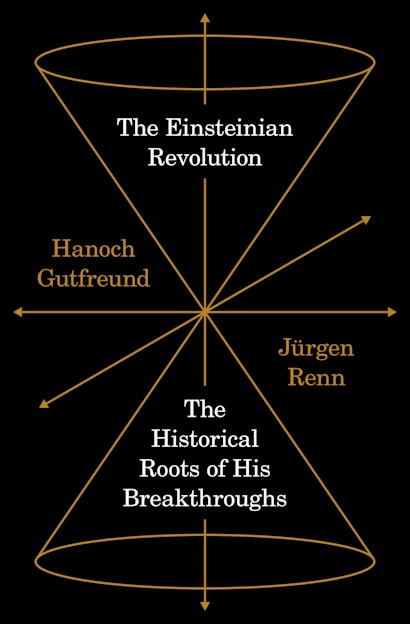Einstein has left his mark not only on physics of the twentieth century but also on the public image of science and scientists and on the cultural and political history of the twentieth century, far beyond his area of expertise. His relativity revolution helped to establish physics as a leading paradigm of modernization, demonstrating that social progress had become dependent on the progress of basic and not only applied science. His contribution to this change of perspective, through his lectures and articles in the general press, cannot be overestimated.
Einstein was constantly in the public eye and great respect and attention were also paid to his personality and to his opinions outside the world of physics. Einstein was a prolific writer. In numerous articles, in correspondence with peers, and in public addresses, he expressed his opinions on a variety of political, social, and moral issues, such as nationality and nationalism, war and peace, human liberty and dignity, and he launched a relentless attack on any form of discrimination. Bluntly expressed, controversial, often considered simpleminded and naive, his positions nevertheless made a significant impact. Einstein’s political and moral views and activities were not simply add-ons to a life devoted to science but driven by the same inner urge as his quest for scientific knowledge and his search for a comprehensive worldview.
Today, one still thinks mainly in terms of a disciplinary character of the structure of science. This is so engrained that we can scarce imagine how science could ever have functioned without being guided by the criteria and values of this image. Einstein had little respect for such disciplinary divisions. For him such divisions contradict the spirit of all culture. On October 5, 1952, he published in the New York Times an article titled “Education for Independent Thought.” There he wrote: “Overemphasis on the competitive system and premature specialization on the ground of immediate usefulness kill the spirit on which all cultural life depends, specialized knowledge included.” Without Einstein’s ability to foster a unifying perspective beyond the borderlines between different domains in the physical sciences, he would not have been able to achieve what he accomplished in 1905, his miraculous year.
While new disciplines and subdisciplines emerge all the time, overcoming such borderlines is still an important mechanism of innovation in science. This is one lesson that we can learn from the Einstein experience about the present state of science. There are also new challenges at the forefront of science that may require an even more profound rethinking of science. Science has become ever more relevant to solving the problems of our world, from climate change to the challenges of feeding and curing humankind, and protecting them from ecological hazards, as well as from their own self-destructive tendencies. Clearly, the traditional organization of science is hardly capable of confronting these challenges.
Such challenges cannot be addressed by science and technology alone. Every step and every method applied in attempts to cope with these issues, both local and global, have to take into account social, economic, and political considerations, as well as cultural and religious traditions. Thus, natural sciences are inseparable from the humanities and social sciences. The type of knowledge orientation we need in confronting today’s challenges can only be effective if this division is overcome. An integration of the intellectual resources, which enables answers to these challenges, today presumes collaborating across traditional borders, both within and outside academia.
One previously widespread doctrine was that science and moral values are separate domains of human existence. Science is about facts and ethics is about norms and values, therefore there can be no interrelation between them. However, during the last decades, this attitude has been changing. The connections between science and war, the intervention in life processes and issues affecting the health of planet earth have indicated to us that serious reflection on the inseparability of scientific judgments and moral judgements is due. In the wake of the big sins of science of the twentieth century, from the production of poison gas during the First World War to its involvement in the holocaust and the development of modern weapons of mass destruction, we have faced this lesson particularly in the form of moral appeals to the responsibility of the individual scientist regarding later applications of his results. It seems that the twenty-first century shifts this responsibility back to the heart of science itself. Intellectual challenges, like the definition of problems, institutional and economical topics like the alternative between open access to knowledge or intellectual capitalism, or fundamental challenges such as those connected to survival within the Anthropocene, concern each individual and simultaneously the system of science as a whole.
Now it is clear that the culture of science must promote the process of reflection and moral integrity of science. Scientists should be conscious of the mutability of knowledge structures and they should have the means to participate in its transformation toward the aim of preserving the living conditions for humanity on this planet.
Keeping in mind how much one single person like Einstein could achieve in the science of his time, also considering the difficult conditions he faced in reflecting across the borders of knowledge structures, we can read the history of his revolution also as encouragement to contribute to a culture of science that is appropriate to our current challenges.
Hanoch Gutfreund is professor emeritus of theoretical physics at the Hebrew University of Jerusalem, where he is also academic director of the Albert Einstein Archives.
Jürgen Renn is director at the Max Planck Institute for the History of Science in Berlin and founding director of the newly established Max Planck Institute of Geoanthropology in Jena. He is the author of The Evolution of Knowledge (Princeton). Gutfreund and Renn are the authors of Einstein on Einstein and The Formative Years of Relativity (both Princeton).

